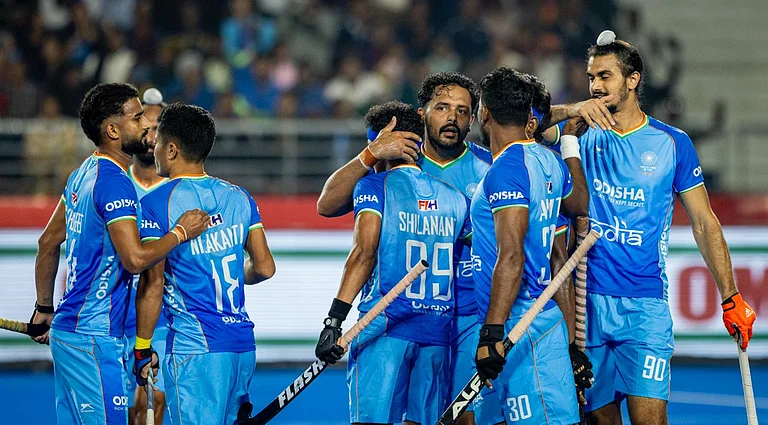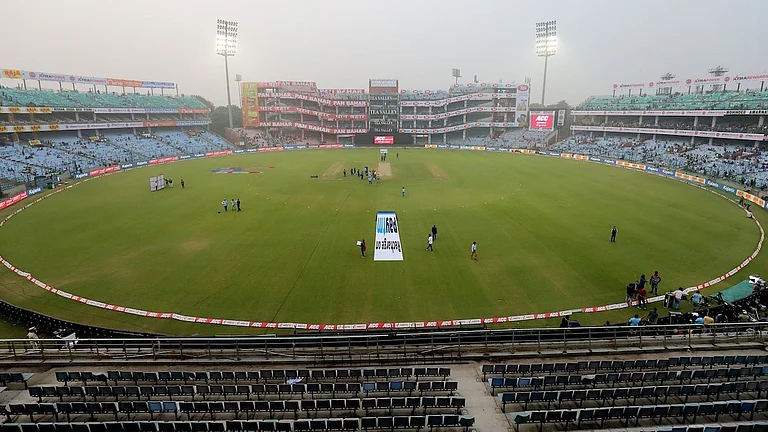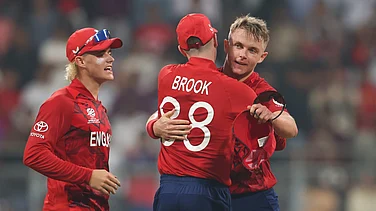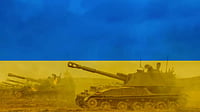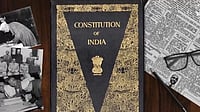As you cross the familiar gates of Jantar Mantar, the protest site of Indian wrestlers which sits comfortably inside the VIP zones of Lutyens Delhi, you are surprised by the air of calm that seems to be around.
It is the evening of Wednesday, April 26, day four of the agitation led by Vinesh Phogat, Sakshi Malik and Bajrang Punia against the wrestling federation chief Brij Bhushan Sharan Singh. The cops are lounging about the barricades, letting people in. They are talking and jesting with journalists, the protesting contingent and all around. That is new. Before, they stood around steely, with their name badges removed, gripping their lathis hard, ready for what was to come. An air of uneasiness, of violence to come, and headlines to follow has always permeated this space. But today, the atmosphere is different. We soon get our answer.
As darkness falls, the wrestlers begin to hand out candles for a candlelight vigil. They are stoic, like true professional athletes who have lived their lives according to unerring codes of discipline and routines.
The only chaos comes from the relentless din and glare of the media pack, which jostles and shoves for the best angles and soundbytes. Even as the candlelight march begins, the glare of the cameras burns into the faces of the movement - Olympians Phogat, Malik and Punia - who have been out here for their fraternity.
Unfazed by the frenzy around them, the wrestlers continue silently. Their numbers may be small, but it is clear that the will of such champions has depths which cannot be fathomed. That is how those medals are earned.
The night closes in, and the vigil is over. The wrestlers retire to the tents that they have been squatting in. Tired, but unfazed. And it becomes obvious what is different here.
Most of the cops are relaxed because they come from the same villages and communities as the wrestlers. They know each other, and although they may stand on different sides of the line here, the respect is mutual.
There is no loud sloganeering. The wrestlers break to eat, and once again the cameras don’t let them be. But they take it in their stride. They have been here before in January, after all.
But it isn't just that. It’s their steely resolve.
Powerful entities such as sports federations and politicians rely on being able to cause chaos and sow discord to eventually break up rising dissent. But a determined group such as these wrestlers can be a worry even for the state.
We witness another example of the discipline of the wrestlers. In one of the tents, as mosquitoes buzz around, the whirr of a massage gun is heard. Even with so much inconvenience around, a wrestler gives his limbs a massage, an important part of any athlete’s daily routine. For tomorrow, they will still get up, and do their practice. Bajrang Punia is indomitable, as is Sakshi Malik. Exhaustion is writ across their faces, and even as they prepare to retire for the night, they still walk over to give final bytes to the media, knowing they are the faces which will garner more attention for their mission to bring justice to the several girls who allegedly were sexually harassed by Brij Bhushan.
As we leave, we pass by Phogat giving a news byte to a newsman in sunglasses at night. He talks at hyper speed, the old trick to corner the unfortunate interviewee into misunderstanding and giving an erroneous statement that can be taken out of context and used later to vilify them. But here, even the press has underestimated their opponents. She is calm and measured in her replies.
The wrestlers give nothing away to be portrayed as disruptors. There is that sense of community that restores one's faith in humanity. When the protestors eat, a point is made to hand out plates to the press pack that has been with them all day long, for they understand how this symbiotic relationship works.
Everyone seems to be on different sides if you read the headlines. But at Jantar Mantar, they are one and the same. Photographers put down their cameras to help people light their candles, rather than take pictures. Local khap leaders and their compatriots spread about the gathering, offering help where needed, and propping up chairs so that camerapersons can get a better view when the big names come around to give bytes. The riot cops, lathis hanging slack, help start the fans so that the contingent can sleep a little more peacefully at night.
There may be no slogans. There is quiet, discipline and calm. But there is reaffirmation. Of the truest solidarity, the one found on the streets, amongst people you don't know, across lines and parties.
We notice one interesting thing. The wrestlers are here because they are fighting a formidable foe - the federation. But above their tents, and on the roads, all around their encampment, they have hung the tricolour of the nation. Because above all, that is the real reason they are here, to forge a better future for future generations of Indian wrestling.
It is a powerful reminder that they aren't here to dissent. They are here because they want to ensure that our flag can fly even higher.








